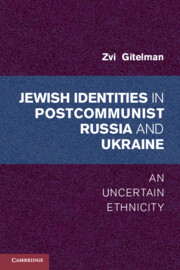
- Publisher:
- Cambridge University Press
- Online publication date:
- November 2012
- Print publication year:
- 2012
- Online ISBN:
- 9781139150989

Before the USSR collapsed, ethnic identities were imposed by the state. This book analyzes how and why Jews decided what being Jewish meant to them after the state dissolved and describes the historical evolution of Jewish identities. Surveys of more than 6,000 Jews in the early and late 1990s reveal that Russian and Ukrainian Jews have a deep sense of their Jewishness but are uncertain what it means. They see little connection between Judaism and being Jewish. Their attitudes toward Judaism, intermarriage and Jewish nationhood differ dramatically from those of Jews elsewhere. Many think Jews can believe in Christianity and do not condemn marrying non-Jews. This complicates their connections with other Jews, resettlement in Israel, the United States and Germany, and the rebuilding of public Jewish life in Russia and Ukraine. Post-Communist Jews, especially the young, are transforming religious-based practices into ethnic traditions and increasingly manifesting their Jewishness in public.
“This is a learned and thought-provoking book, written by the foremost scholar on Soviet and post-Soviet Jewry. In it, Gitelman argues that the identity of post-Soviet Jews is purely ethnic and is divorced from the Jewish religion, Hebrew and Yiddish language, and Jewish ‘thick culture.’ As such, it is a form of Jewish identity unprecedented in history, and radically different from that of American Jews. Based on painstaking fieldwork, and buttressed by Soviet Jewish history, social theory, and comparative studies, Gitelman probes the challenges that post-Soviet Jewish identity both poses and faces.” – David E. Fishman, Jewish Theological Seminary of America
“Measuring ethnicity and identity are difficult tasks for social scientists, and in the case of the Jews of the former Soviet Union it is a particularly daunting task because of the efforts of the Soviet government to change the identity of Soviet Jews from one that was religiously based to one that was based on ethnicity. Zvi Gitelman has done a masterful job of dealing with this issue, and his book is highly recommended for anyone interested in the fate of the Jews of the former Soviet Union.” – Robert O. Freedman, Johns Hopkins University
“Zvi Gitelman has produced yet another definitive monograph. Based on an impressive number of surveys, in-depth interviews, and statistical data, Jewish Identities in Postcommunist Russia and Ukraine uncovers the process of many transitions and transformations of the Soviet Jews after the collapse of the Soviet Union. Meticulous analysis, wide scope of research, and far-reaching conclusions ultimately make this study a must-read for everyone in the field of Soviet and post-Soviet studies, and contemporary Jewish politics.” – Anna Shternshis, University of Toronto
“Gitelman's book goes much beyond in-depth historical and contemporary accounts of Jewish identities in postcommunist Russia and Ukraine. Its comparative perspective turns it into a broader study of Jewish identities worldwide, especially in the United States and Israel. It touches on the nature, fate, and future of the Jewish people. Gitelman sets a model for a scholarly analysis of ethnic identity, Jewish and non-Jewish. His book is a must-read for anyone interested in minority identity and ethnicity.” – Sammy Smooha, University of Haifa
 Loading metrics...
Loading metrics...
* Views captured on Cambridge Core between #date#. This data will be updated every 24 hours.
Usage data cannot currently be displayed.
Accessibility compliance for the PDF of this book is currently unknown and may be updated in the future.